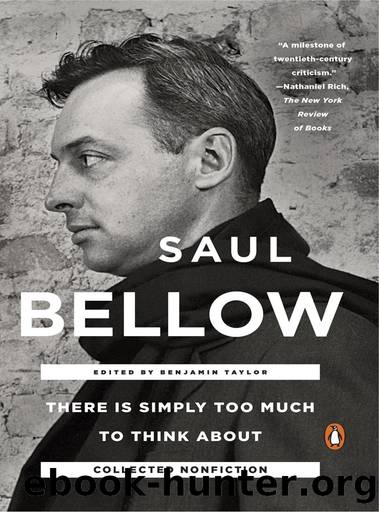There Is Simply Too Much to Think About: Collected Nonfiction by Saul Bellow

Author:Saul Bellow [Bellow, Saul]
Language: eng
Format: azw3
Tags: Essays, Philosophy, Nonfiction, Writing
ISBN: 9780670016693
Publisher: Viking
Published: 2015-03-30T23:00:00+00:00
An Interview with Myself
How do you, a novelist from Chicago, fit yourself into American life? Is there a literary world to which you belong?
When I entered the Restaurant Voltaire in Paris with the novelist Louis Guilloux some years ago, the waiter addressed him as âMaître.â I didnât know whether to envy him or to laugh up my sleeve. No one had ever treated me so reverentially. I knew how important literature was to the French. And as a student I had sat (in Chicago) reading of salons and cénacles, of evenings at Magnyâs with Flaubert and Turgenev and Sainte-Beuveâreading and sighing. What glorious times! But Guilloux himself, a Breton and a former left-winger, seemed to flinch when he was called âMaître.â It may be that, even in Paris, literary culture is now publicly respected only by smarmy headwaiters. Here I am not altogether on firm ground. What is certain is that nothing like this happens here. In America we have no Maîtres except in dining rooms, no literary world, no literary public. Many of us read, many love literature, but the traditions and institutions of literary culture are lacking. I do not say that this is bad, I only state it as a fact that ours is not a society that interests itself in such things. Any modern country that has not inherited these habits of deference simply does not have them.
American writers are not neglected; they mingle occasionally with the great; they may even be asked to the White House, but no one there will talk literature to them. Mr. Nixon disliked writers and refused flatly to have them in, but Mr. Ford is as polite to them as he is to actors, musicians, television newscasters and politicians. At large receptions the East Room fills with celebrities who become ecstatic at the sight of other celebrities. Secretary Kissinger and Danny Kaye fall into each otherâs arms. Cary Grant is surrounded by senatorsâ wives who find him wonderfully preserved, as handsome in the flesh as on film. They can hardly bear the excitement of personal contact with greatness. People speak of their diets, of their travels, of the vitamins they take and the problems of aging. Questions of language or style, the structure of novels, trends in paintingâthese are not discussed.
The writer finds Mr. Fordâs party a wonderful pop occasion. Senator Fulbright seems almost to recognize his name and says, âYou write essays, donât you? I think I can remember one of them.â But the senator, as everyone knows, was once a Rhodes scholar. He would remember an essay.
It is actually pleasant on such an evening for a writer to pass half disembodied and unmolested by small talk from room to room, looking and listening. He knows that active public men canât combine the duties of government with literature, art and philosophy. Theirs is a world of high-tension wires, not of primroses on the riverâs brim. Ten years ago Mayor Daley in a little City Hall ceremony gave me a five-hundred-dollar check on behalf of the Midland Authorsâ Society for my novel Herzog.
Download
This site does not store any files on its server. We only index and link to content provided by other sites. Please contact the content providers to delete copyright contents if any and email us, we'll remove relevant links or contents immediately.
The Rules Do Not Apply by Ariel Levy(3899)
Bluets by Maggie Nelson(3705)
Too Much and Not the Mood by Durga Chew-Bose(3690)
Pre-Suasion: A Revolutionary Way to Influence and Persuade by Robert Cialdini(3404)
The Motorcycle Diaries by Ernesto Che Guevara(3326)
Walking by Henry David Thoreau(3228)
What If This Were Enough? by Heather Havrilesky(2943)
The Day I Stopped Drinking Milk by Sudha Murty(2852)
Schaum's Quick Guide to Writing Great Short Stories by Margaret Lucke(2797)
The Daily Stoic by Holiday Ryan & Hanselman Stephen(2703)
Why I Write by George Orwell(2355)
Letters From a Stoic by Seneca(2330)
The Social Psychology of Inequality by Unknown(2305)
A Short History of Nearly Everything by Bryson Bill(2131)
Feel Free by Zadie Smith(2095)
Insomniac City by Bill Hayes(2080)
A Burst of Light by Audre Lorde(1979)
Upstream by Mary Oliver(1931)
Miami by Joan Didion(1877)
